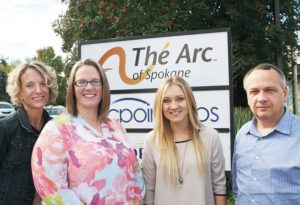Blaze a Trail to Future Planning
In the spirit of this year’s Older Americans Month theme, “Blaze a Trail,” The Arc recognizes the many parents of adults with intellectual and developmental disabilities (IDD) who fought for decades to raise their children at home, to realize their rights to free and appropriate public education, and for recognition as valued contributors to the community. The Arc is committed to supporting these aging caregivers and their adult sons and daughters with IDD to develop a roadmap for the future.
Future planning is important for all families, but it can be especially challenging for the almost 1 million families in which adults with IDD are living with aging caregivers. In two-thirds of these families, there is no plan in place for the future. Many of these families have no connection to the disability community or the disability service system. It is our role to support them to overcome the fear of planning and provide them the information and resources they need to create future plans.
To support these trailblazing families, The Arc of the United States launched the Center for Future Planning™ in 2014. Discussing these major life transitions and putting a plan in place may actually alleviate some of the stress experienced by aging caregivers, their adult sons and daughters, and other family members and supporters.
The Center’s website provides reliable information and assistance to individuals with IDD, their family members and friends, staff at chapters of The Arc, and other disability professionals on:
- person-centered planning
- supported decision-making and guardianship
- housing options
- financial planning (including public benefits, special needs trusts, and ABLE accounts)
- employment and daily activities
- making social connections
- providing information if an urgent need arises
During Older Americans Month, here are some ways you can access more help:
- Read more information about future planning and see how other families have planned.
- View The Arc’s webinar on supports and services for aging caregivers.
- Visit The Arc’s new Build Your Plan™ online tool that enables families to create accounts and begin to build their plans within the Center for Future Planning™.
- Encourage families you know to start the process and to get support in their communities. Chapters of The Arc around the country can provide guidance and information about local resources. Families can also identify professionals in their communities to help them create and implement future plans through The Arc’s Professional Services Directory.
- In addition, Area Agencies on Aging (AAA) can help with accessing services and support available to seniors. AAAs offer a variety of home and community-based services such as respite, meals on wheels, and transportation. Visit ncoa.org for more information about additional benefits available to seniors.
Supporting aging caregivers and adults with IDD is an ongoing process and is possible with the help of other family members, friends, the community and professionals. It’s important to work together to develop a plan that will ease the stress of future transitions. You can contact The Arc’s national office at (202) 202-617-3268 or futureplanning@thearc.org for more help.


 It is with heavy hearts we share the news that Adonis Reddick passed away last week. Adonis was an amazing and powerful advocate and we will remember him as a dear friend to The Arc.
It is with heavy hearts we share the news that Adonis Reddick passed away last week. Adonis was an amazing and powerful advocate and we will remember him as a dear friend to The Arc.






